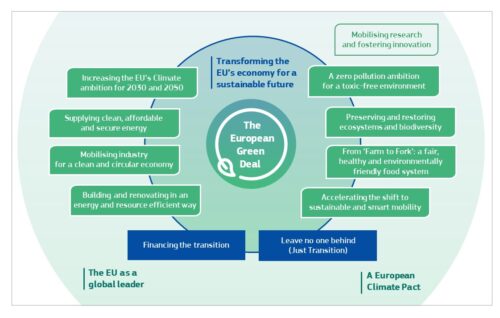COURTESY : www.switchtogreen.eu
Green deal
presents a roadmap for making the EU’s economy sustainable by turning climate and environmental challenges into opportunities across all policy areas and making the transition just and inclusive for all. The European Green Deal aims to boost the efficient use of resources by moving to a clean, circular economy and stop climate change, revert biodiversity loss and cut pollution. It outlines investments needed and financing tools available, and explains how to ensure a just and inclusive transition. The European Green Deal covers all sectors of the economy, notably transport, energy, agriculture, buildings, and industries such as steel, cement, ICT, textiles and chemicals.
The European Green Deal provides an action plan, to boost the efficient use of resources by moving to a clean, circular economy and to restore biodiversity and cut pollution. It embraces various policy areas (compare timeline to the right).
Policy areas of the EU Green Deal:

One area embraces the EU action plan for the Circular Economy (CEAP) II: The Circular Economy Package has been adopted with a view to boosting global competitiveness, fostering sustainable economic growth and generating new jobs. It consists of two EU Action Plans for the Circular Economy (2015 and 2020), with measures covering the full life cycle of products: from production and consumption to waste management and the market for secondary raw materials. Building on the work done on circular economy since 2015, the CEAP II focuses on resource intensive sectors where the potential for circularity is high. Aiming to keep resources in economic cycles as long as possible, the plan addresses key product value chains: electronics and ICT, batteries and vehicles, packaging, plastics, textiles and food.
The proposal for a Regulation on Ecodesign for Sustainable Products addresses product design, which determines up to 80% of a product’s lifecycle environmental impact. It sets new requirements to make products more durable, reliable, reusable, upgradable, reparable, easier to maintain, refurbish and recycle, and energy and resource efficient. In addition, product-specific information requirements will ensure consumers know the environmental impacts of their purchases. All regulated products will have Digital Product Passports. This will make it easier to repair or recycle products and facilitate tracking substances of concern along the supply chain. The new proposal extends the existing Ecodesign framework in two ways: first, to cover the broadest possible range of products; and second, to broaden the scope of the requirements with which products are to comply.
The Farm to Fork Strategy lays down a new approach to ensure that agriculture, fisheries and aquaculture, and the food value chain contribute appropriately to the objective for a climate neutral Union in 2050. Food systems remain one of the key drivers of climate change and environmental degradation. The manufacturing, processing, retailing, packaging and transportation of food make a major contribution to GHG emissions, air, soil and water pollution, and have a profound impact on biodiversity. On the other side, consumers also need to be empowered to choose sustainable food. The creation of a favourable environment that makes it easier to choose healthy and sustainable diets will benefit consumers’ health and quality of life, and reduce health-related costs for society.
The new 2030 Biodiversity Strategy is a comprehensive, systemic and ambitious long-term plan for protecting nature and reversing the degradation of ecosystems. It is a key pillar of the European Green Deal and of EU leadership on international action for global public goods and sustainable development goals. With an objective to put Europe’s biodiversity to recovery by 2030, the Strategy sets out new ways to implement existing legislation more effectively, new commitments, measures, targets and governance mechanisms.
The Zero Pollution Action Plan provides a compass to mainstream pollution prevention in all relevant EU policies, to step up implementation of the relevant EU legislation and to identify possible gaps. It includes targets on air, water, soil, and noise pollutions as well as waste generation and biodiversity


